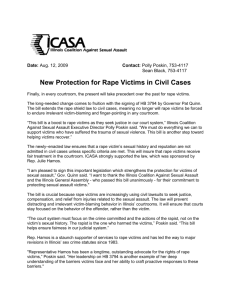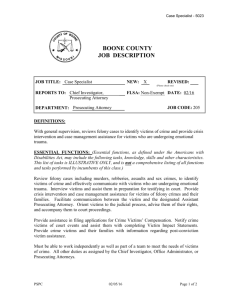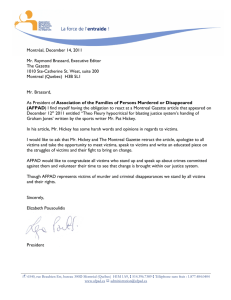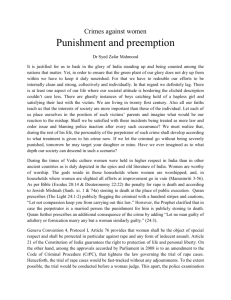Running Head: Naming Rape Victims in the Media
advertisement
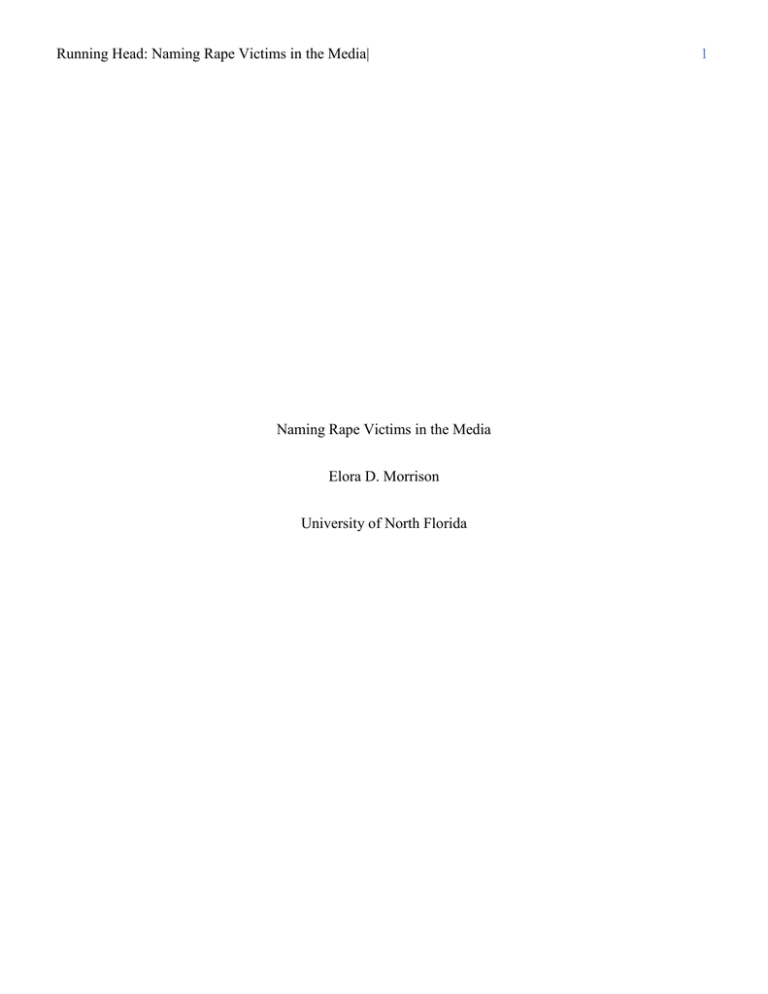
Running Head: Naming Rape Victims in the Media| Naming Rape Victims in the Media Elora D. Morrison University of North Florida 1 Running Head: Naming Rape Victims in the Media| Naming rape victims in the media should be illegal. The only exception should be when the victims themselves give consent. Currently, there are no states with laws against the naming of rape victims in the media. This leaves the practice of naming victims to the discretion and ethical judgment of the news outlets. When rape victims are named in the media, it can create a negative stigma against those who have already suffered a terrible violation, in effect violating them again. Many people agree that the naming of rape victims should become illegal and as a result many organizations have formed, such as the National Victim Center. Data and statistics have been gathered in an effort to show the effects of naming rape victims in the media and to support the need to create laws that require victims to consent before their names are printed. This paper will provide an in-depth view of the ethical dilemma of naming rape victims, the stigmas that are created, and the work of the organizations for victims. The statistics and the developments in the laws concerning the naming of rape victims will be discussed. There is a need to for such a law to protect these victims, giving them the choice if they want their names disclosed for all to see. The naming of rape victims in media coverage is an ethical, rather than legal issue, because there are no laws that protect the privacy of victims of this horrendous crime. This leaves the decisions about the naming of victims to the ethical sensibilities of newspaper editors. The victims have no choice as to whether they wish to withstand the re-victimization that can come from public knowledge of their very personal violation. Only two states, Florida and South Carolina, had laws prohibiting the publication of rape victims’ names and the constitutionality of those statutes is being tested. The Supreme Court overturned the Florida statute in light of a 1974 high court ruling that struck down a similar Georgia law (Elliott, 1989). As with any ethical question, journalists make arguments on both sides of the issue. Some argue 2 Running Head: Naming Rape Victims in the Media| that there is a need to protect the victims and that the naming of accusers serves no purpose and will only cause pain. In the book, Virgin or Vamp: How the Press Covers Sex Crimes, journalist and author Helen Benedict called the naming of rape victims without their consent punitive saying: "To name a rape victim is to guarantee that whenever somebody hears her name, that somebody will picture her in the act of being sexually tortured" (as quoted in Hindery, 2004, 13). This is reflected in many statistics that shall be discussed later. Those on the other side of the debate argue that it is a necessary evil to name rape victims. Michael Gartner, president of NBC news said although he appreciates the pain for those initially identified, the media should identify victims of rape. "Rape is a crime in which people still tend somehow to blame the victim," he said. "One reason is that the press puts this mystery around it by refusing to name the name" (Elliott, 1989). This brings the argument full circle. Advocates are appalled at Mr. Gartner’s suggestion that the media is doing a favor for the victims by printing names in the stories that cover rape charges. How does that make sense to the victim? The victim gets raped and then has to relive the ordeal again when the newspaper comes out the next morning or when the television is turned on to the news (Elliott, 1989). Journalists are currently able to name victims without their consent as long as the information was legally obtained. Media professionals are often more concerned about writing a great story or increasing viewer ratings and not adequately concerned about how their story affects the victims livelihood. The story may be printed at the expense of the victim. Events can be reported without the names being printed. If journalists felt that name the victims would truly be a great benefit, they should make their argument to the rape victim. These victims should have the right to hear these arguments and then decide if they are willing to allow their names to be printed. The news media should not be allowed to print victims’ names without their prior consent. 3 Running Head: Naming Rape Victims in the Media| One of the major components of the ethical dilemma is the stigma that follows a rape. Even though we are more progressive and enlightened today, there is still a tendency to blame the victims of the rape or at least find them to be partially to blame. The stigmas created are just one more reason to make it illegal to print the names of rape victims without their consent. If consent is required, then at least the women have a chance to decide whether or not they wished to deal with being stigmatized. The media’s impact can be negative on individual lives when victims are thrust, unwillingly into the limelight solely because of the crimes committed against them. Inaccurate reporting and insensitivity to the victims’ needs for privacy compound the trauma of crime and often re-victimize the victim. For example, a woman in North Carolina describes the situation from her point of view: “I was hesitant to file charges against the person who raped me twice, repeatedly threatened to kill me…all because I knew that my name would appear in the Winston-Salem Journal. How many people get away with rape in this city because the victim is afraid of possible shame, threats, etc. after being named?” (Haws & Ramsey, 1996, para. 2). The unknown woman brings up a choice that haunts many rape victims. Do I want to be victimized again? Is seeking justice worth the public scorn? Victims of crime should never have to face this choice. The choice to go public with the crime should be up to the victim rather than editors of newspapers and journalists. Michael Rouse is the managing editor at the Fayetteville Observer and he argues that both parties involved, victim and perpetrator, should be treat equally in a rape story: "Why should you treat one in such a way that you don’t treat the other and imply that she is the one that is stigmatized?" Rouse goes on to say, "I don’t think that the stigma of rape is what it used to be, but there is a hell of a stigma with the charge of raping somebody” (Elliott, 1989, 9). This mindset was displayed while Rouse was the editor at the Durham Morning Herald in the 1970s 4 Running Head: Naming Rape Victims in the Media| saying, “If a woman reported a rape and nobody was charged, her name wasn’t used. She hadn’t pointed a finger at anybody, hadn’t placed anybody in jeopardy. However, if she made an accusation against another person, setting the wheels of justice in motion against him, we felt that both parties should be treated equally" (Elliott, 1989, 10). That policy was refined in 1978 so that the exact addresses of victims were no longer used. This policy reflects the need for a law geared toward rape victim protection. Somehow Rouse seems to think that there should be equality in treatment as if blame in the event is equally shared. This is exactly the dangerous thinking that victims must be protected from (Elliott, 1989). Davia Temin is a board member of Women's eNews and she agrees and stated, “Naming victims just doesn't hold any humanistic value…It's like victimizing them a second time" (Hindery, 2004, 13). Some may believe that Temin may be biased in her opinion, considering that she is in charge of a women’s electronic magazine, but what she says is true. At least if victims of rape had the legal right to consent to their name being released, the victims would have a choice as to whether their name would become part of the public record or not. Researchers have collected data and statistics in order to better understand the ethical and other implications, of naming rape victims in the media. As the rape victim from North Carolina predicted, this research has given statistical credence to the negative effect that naming victims has on the reportage of the crime. Studies show that many people, mostly women, are in favor of making it illegal to name rape victims. Various studies indicate that crime victims, especially sexual assault victims, would be more likely to participate in the criminal justice system if the media were more respectful of their privacy. Data from The National Women's Study presented in Rape in America: A Report to the Nation found that 84 % of rape victims in America do not report the crime to police (U.S. Department of Justice, 2009). Half of rape victims, a full 50%, 5 Running Head: Naming Rape Victims in the Media| would be more likely to report their rape to police if there was a law prohibiting the news media from disclosing their name and address, while 16% indicated that they would be somewhat more likely to report rapes to the police (U.S. Department of Justice, 2009). Only 16% of rapes are actually reported, mainly because the women do not want their names to be displayed for all to see. Almost 9 out of 10 women, or 86%, felt that victims would be less likely to report rapes if they felt their names would be disclosed by the media (U.S. Department of Justice, 2009). The previous statistics reflect that no law preventing the media from disclosing personal information about a sexual assault victim hurts society and women alike. Many rapes go unreported because women fear that the media will use their names and then everyone who reads the story will know who, what, when and where everything happened. With consent required more women would feel safer to report their rape to the police and all they would have to do is sign a form saying “use my name in your story” instead of keeping the terrible event pent inside just so their names won’t get disclosed to the media. The press feels differently about the issue of naming rape victims in the media, with 24% of editors believing that withholding the names of rape victims was a violation of the public's right to know (U.S. Department of Justice, 2009). This statistic show a greater concern for the public’s right to know, the press main concern, rather than protecting the victims’ privacy. “The decision to withhold a name should be the newspaper's and not mandated by legislation prohibiting the press from publishing the name of a sexual assault victim. Almost three-fourths of editors believed that such laws should be repealed because they violate the First Amendment” (U.S. Department of Justice, 2009, 315). Those in the news media seem to think that they should have to power to make all decisions about the naming rape victims and that any laws protecting victims’ rights should be repealed. The protection of victims’ privacy in Florida was repealed in 6 Running Head: Naming Rape Victims in the Media| Florida v. Globe Communication Corp (Farish, 2010). This gave the newspapers more power, and will be addressed in-depth in the next paragraph. An overwhelming majority of women (75%), rape victims (78%), and rape service agencies (91%) favored legislation that would prohibit media disclosure of rape victims’ names (U.S. Department of Justice, 2009). This begs the question, why are there not strong federal laws protecting further victimization and barring naming rape victims in the media? There may not be any law currently, however, organizations are working to increase awareness and change the law. Organizations have developed in an effort to increase awareness and better advocate for rape victims. In the past few decades, several national victim advocacy organizations have developed media codes of ethics. A brochure published in 1987 by the National Victim Center (NVC), Victims’ Rights in the Media, offers valuable guidelines for the ethical coverage of crime victims by print and broadcast media. In addition, the National Organization for Victim Assistance has developed a working policy for media coverage of victimization, The Victim Advocates Guide to the Media, which examines the areas of greatest concern to crime victims and their families (U.S. Department of Justice, 2009). While no law exists, the issue has been brought up by not only the NVC and the National Organization for Victim Assistance. Unfortunately, the Presidents’ Task Force on Victims of Crime failed to issue recommendations specifically pertaining to the news media, although the longstanding ethical dilemma surrounding the public's right to know versus the victim's right to privacy has received substantial attention from media professionals, legal scholars, and crime victims and their advocates. One of the first formal examinations of the legal and ethical considerations of this crucial issue took place in 1986 at a Crime Victims and the News Media symposium in Fort Worth, Texas, sponsored by the Texas Christian University Department of Journalism and the 7 Running Head: Naming Rape Victims in the Media| Gannett Foundation. The symposiums participants concluded that ensuring responsible media coverage of crime and victimization is a two-way street. Journalists must become more knowledgeable about crime victims' needs and concerns, and victim service providers must learn more about issues and constraints journalists face when covering crime (U.S. Department of Justice, 2009). Florida was one of the few states with laws making it illegal to print the name of a sexual assault victim. However, in Florida v. Globe Communications Corp, the Supreme Court overturned the law (Farish, 2010). In reporting the story about the alleged suspect William Kennedy Smith, the Globe twice identified the woman’s name and other features. The Globe obtained the information lawfully, and at least four British newspapers had identified the victim before the Globe’s stories on the crime. The Globe filed a motion to dismiss the charges, claiming the law violated the organization’s First Amendment right to free speech and press. The trial court accepted both arguments and dismissed the charges. On appeal, the district court affirmed the decision. The state Supreme Court used the U.S. Supreme Court decision in Florida Star v. B.J.F. to support their opinion that the law was unconstitutional, stating the law was overbroad and only punished media publications and not acts by a private person (Farish, 2010). With the Florida law repealed, there is now no law against the naming of rape victims in the media. However, there are groups forming to advocate on the behalf of rape victims including the ones mentioned above. Those on the other side of the debate argue that it should be legal to name victims by name because it is in the best interest of the general public. Journalists should publish sex-crime victims' names because doing so promotes truth and helps reduce the stigma of the crime. A small number of journalists also say sex-crime victims should be named because it is journalists' obligation to put all available facts before the public so people can make informed decisions 8 Running Head: Naming Rape Victims in the Media| (Johnson, 1999). This again seems to promote the idea that a woman is somehow responsible for the crime commented against her. The belief that the people should get to decide whether a woman was actually raped or not, whether she “deserved it,” or if she deserved the personal violation is one of the main reason such a negative stigma exists. This belief, that the public should have the right to debate the rape, is how the practice of naming victims can lead to that victim becoming victimized again. The victim should have the right to decide whether she wants her name in the paper and subject herself to the speculation that will certainly follow. Her suffering is not in the best interest of the public. If there were a law demanding that journalists must obtain consent from the sexual assault victims then the above wouldn’t be such an issue. Victims of rape should have the right to choice whether or not they want their name printed in newspapers or displayed on the evening news. Journalists, as of now, have the power to post the names of victims in news stories in the name of free speech through the first amendment. This means that the issues surrounding naming victims is ethical not legal. Stigmas that surround the victims are an immense issue, often preventing women from reporting the initial rape to the police. Despite the lack of proper laws and regulations in naming rape victims, many victim advocacy organizations have tried to help shift media policies in the favor of victims but at a slow pace. The studies and statistics support that naming rape victims reduces the number of women who report their unfortunate encounter to the police and also reflects the female population support for new laws to be put in place protecting their names and privacy. Hopefully, in the near future, laws will be put into place protecting the right of rape victims to keep their name from the media and ultimately protecting them from the stigmas that they fear. Victims need to have protection against further personal intrusion and should not have to rely on varying the ethical decisions of those who control what is printed. Strong federal laws are 9 Running Head: Naming Rape Victims in the Media| needed to protect victims of rape. Naming rape victims in the media should not be legal without the proper consent. 10 Running Head: Naming Rape Victims in the Media| Bibliography Elliott, D. (1989). Anonymity for rape victims. The Newsletter On Journalism Ethics, 1(3), Retrieved from http://journalism.indiana.edu/resources/ethics/namingnewsmakers/anonymity-for-rape-victims/ Farish, J. (2010, April 5). Florida v. Globe Communications Corp., 648 So.2d 110 (Fla. 1994) [Web log message]. Retrieved from http://lawclassolemiss.wordpress.com/2010/04/05/florida-v-globe-communications-corp648-so-2d-110-fla-1994/ Haws, D, & Ramsey, M. (1996). The Winston-salem journal and the identification of sexual assault victims. Newspaper Research Journal, 17(3/4), 98-104. Retrieved from Research Library. (Document ID: 12421433). Hindery, R. (2004, September 24). Debate on naming rape accusers continues. Womens E News Retrieved from http://www.womensenews.org/story/rape/040924/debate-naming-rapeaccusers-continues Johnson, M. (1999). How Identifying rape victim affects readers' perception. Newspaper Research Journal, 20(2), 64-80. Retrieved from Research Library. (Document ID: 42710639). Kelly McBride. (2002, October). Rethinking rape coverage. The Quill, 90(8), 8-11. Retrieved from ABI/INFORM Global. (Document ID: 239853661). National Alliance To End Sexual Violence (2008) Naming rape victim in the media a policy statement. Retrieved from http://www.naesv.org/Policypapers/NamingRapeVictimsInMedia.html 11 Running Head: Naming Rape Victims in the Media| U.S. Department of Justice, Office of Justice Programs, Office for Victims of Crime (2009) New directions from the field: Victims’ rights and services for the 21st century. Chapter 13: The news media community. Retrieved from http://www.ojp.usdoj.gov/ovc/new/directions/pdftxt/chap13.pdf 12
